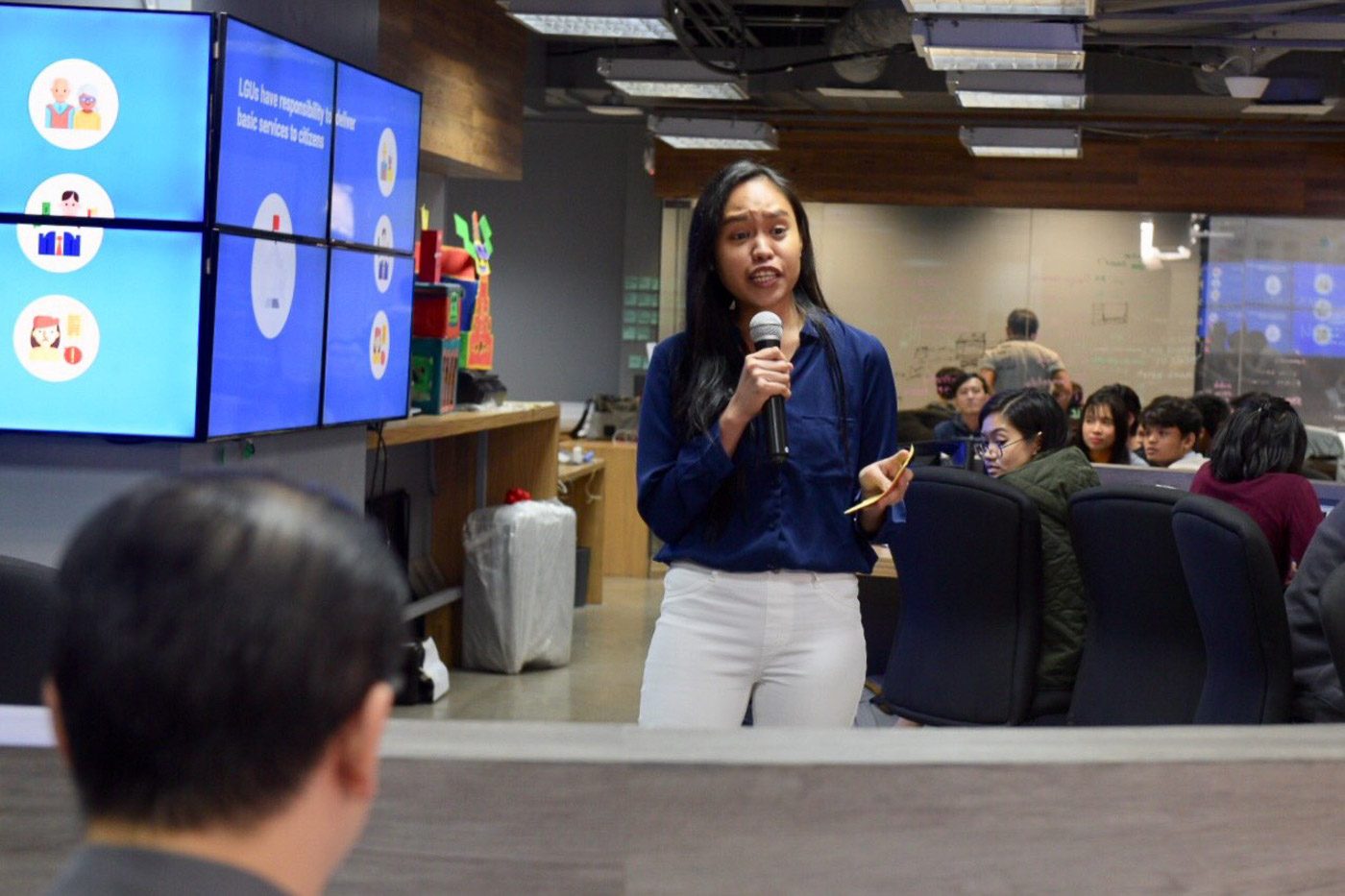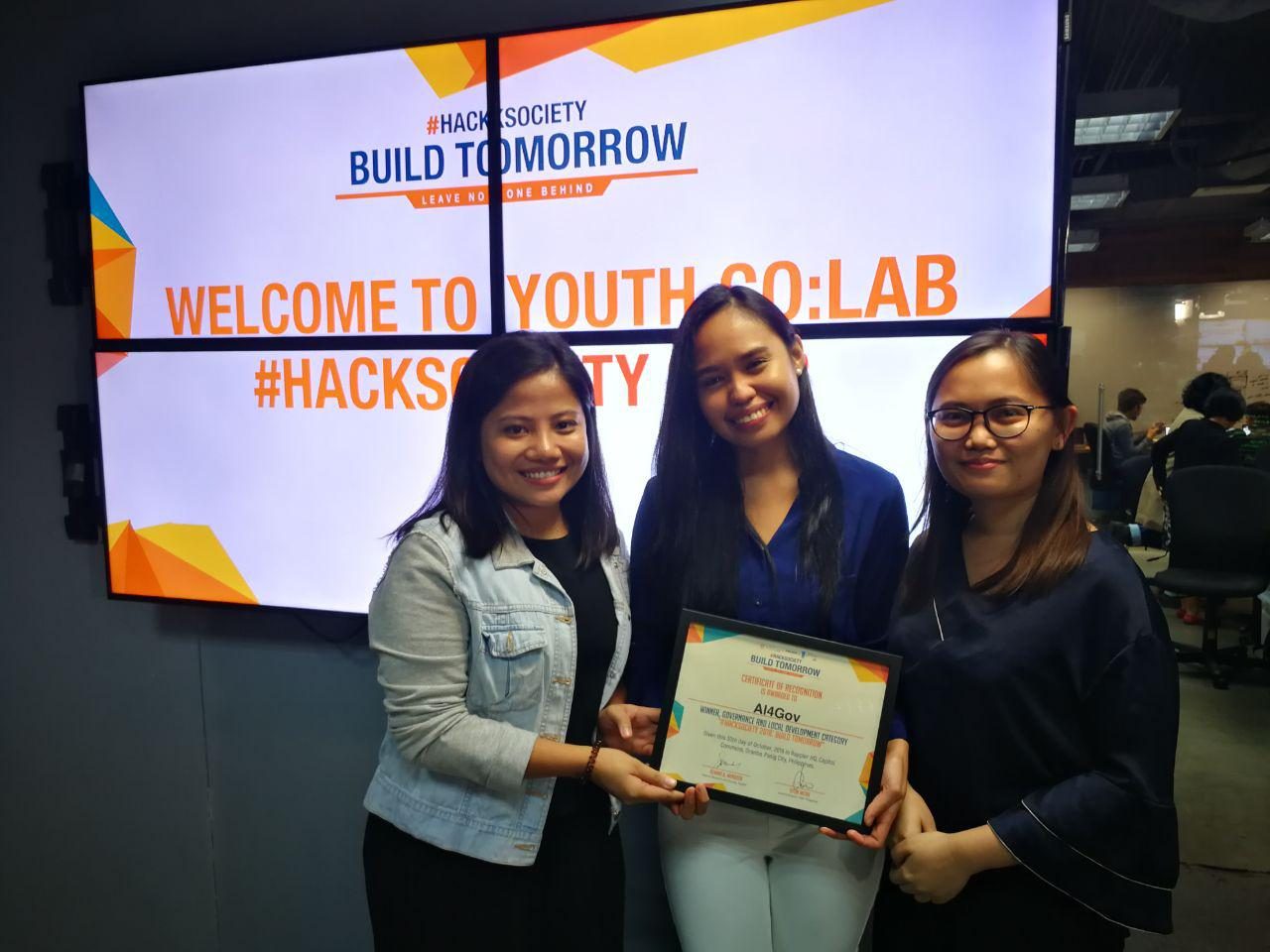SUMMARY
This is AI generated summarization, which may have errors. For context, always refer to the full article.

#HackSociety 2018’s governance category winner AI4GOV certainly believes that things could certainly be faster when dealing with local government units (LGUs). Made up of team members with experience as civil servants, they know both the pains of the constituent lining up to acquire an important government document and the troubles from the backend.
And so an idea: empower LGUs with technologies that can make the whole process more painless. With the help of artificial intelligence (AI), AI4GOV wants people to have a way to connect to their respective LGUs, and get the information they need fast via online pages and platforms, and through SMS in the future.
Many Filipinos are already online, and are familiar with digital tools. Some LGUs, in fact, have also already put up their own Facebook pages through which they can be reached. But with AI – specifically, smart AI-powered chatbots – they believe can automate many of these interactions, thus freeing up personnel from simple keeping-the-lights-on duties to more valuable, creative work, the team says.
But more than the technical implementation, they also want to make civil servants more confident in using tech, easing them from “hard copies” to digital data. It’s a multi-pronged approach, encompassing the technical matters and the addressing of potential use issues among the employees. The team will also once again be presenting their idea at the Department of Infomation and Communications Technology’s #Hack4PH innovation challenge, happening from November 24 to 26, 2018.
After their victory at #HackSociety, we caught up with Lei Motilla, the team’s representative at the pitch, to ask them more about their vision and what inspired them to craft such a solution. Read our conversation below.
Why is the issue of improving LGU services close to your heart and the team’s? What experiences did the team personally go through that spurred it to tackle and develop a solution for this particular issue?
Most of our team members have experience as civil servants. Two are currently embedded in LGUs in Cavite and Laguna, others have worked in National Government Agencies. We’ve personally witnessed the frontend of long queues and bureaucratic requirements for social assistance and what happens at the backend when a personnel has to refer to different departments to find answers for client inquiries, including the risk for miscommunication involved in these internal transactions. We feel the frustrating inefficiency because we’ve been immersed in this system.
What’s common in the team is that we’re all active youth leaders in our network and advocates for digital transformation and local development. When we saw the category for #Hackathon 2018, we immediately saw it as an opportunity to connect the team and brainstorm on our approach, tackling it with academic discipline, grounded in practical experience.
The team anchored the solution on artificial intelligence. How did you arrive at the decision to choose and mobilize AI and related technologies for this problem?
Our solution is not new. Several governments around the world has been tapping into artificial intelligence in providing effective and efficient social services that limited human resource would take weeks or months to deliver. We want to use this innovation, but tailor fitting it to the needs of Philippine LGUs. We know that 97% of internet users in the Philippines are using Facebook.
Several LGUs have already taken advantage of this connectivity and free data by creating their own municipal facebook pages so citizens may reach them directly through this channel.

Case in point: One of our team members is the information officer who handles 3 facebook pages of the Municipality of Carmona. She understands firsthand how even this LGU initiative to be accessible using facebook has its limitations.
She would receive 10 to 20 inquiries per day about requirements on different social services and complaints, and would spend time referring to different departments to answer inquiries. This gave us further insight that a lot of these FAQs can be automated to free up personnel from mundane/transactional tasks in order to accomplish more valuable creative work.
We have been using basic chatbots in ASEAN Youth Community’s Facebook page, and immediately thought that it can be applied as a practical hack to provide consistent information on basic services in LGU’s facebook pages, have analytics on feedbacks or complaints received through messenger, and even integrate with SMS service.
What can you say about the current digital transformation that the country is undergoing, regardless of the sector? Are you seeing ways by which we can speed up this transformation?
The challenge is bridging the digital divide to truly leave no one behind. This involves public investment in digital infrastructure to provide access to opportunities brought by digital connectivity. The DICT already has existing initiatives for digital transformation, from establishing the Philippine Digital Strategy framework for e-governance, to infrastructure development such as Pipol Konek (free wifi access in public spaces), digital ID system, and use of digital technology for ease of doing business.
They also continue to recognize LGUs who take the lead in e-governance.
However, as we emphasized in our presentation, it is not about simply utilizing available digital tools, but understanding the importance of the “digital change-management process” or what we refer to as digital co-ownership process. This is critical because not every personnel in an LGU is confident in using tech, some may not be comfortable with it, resist it altogether, or may have low trust in the reliability of “digital” data compared to tangible printed “hardcopies”, that they were used to.
If we want to speed up transformation, we have to adopt a wider view of tech that understands the importance of the nuances or realities in the points-of-view and relationship of users.
This is the reason why our team underscored the “digital co-ownership” process as the strength in our innovation, it is not just about applying AI as a tool, but our service is mainly the process of empowerment for LGUs to champion digital – learn to utilize digital tools themselves, and be involved in applying human-centered design and iteration processes required to improve their service delivery.
The transformation will take time. We have to diligently demonstrate evidence-based wins with our early adopters before we can gain more LGUs or sectors who will be comfortable in championing digital transformation. We can fail early and fail small with early prototypes, then learn from it and accelerate with the help of partners and youth enablers.
In what ways do you think Hack Society helped you to improve upon your ideas and plans?
#HackSociety helped us articulate our solution to be more specific and imagine the personas of our market to sharpen our business model. We also thought more about our business strategy, financial model, and entry points for contract signing with local government units through the guidance of our mentors.
Did you encounter a lot of challenges while developing your idea?
We spent a lot of time deep diving into research and getting lost or overwhelmed in different articles or documents – generally overthinking the idea. We care deeply for higher social goals such as participatory governance and social trust, we don’t find it worth it to just deliver a service for efficiency without a strong intention to disrupt status quo and make a relevant social impact.
So this was one of the struggles that we experienced in articulating our problem statement. We have to constantly catch ourselves when we’re up in the clouds to ground our frame of mind from academic quests into practical matters, and balancing it with entrepreneurial considerations.
Through the mentorship in #hacksociety we learned to identify a more practical problem and solution statement, without compromising our initial intention to help in increasing social trust. So we ended up segmenting our implementation plan into phases and focusing on getting the first phase as practical and as simple as we can, instead of conflating all that we want to do at the same time.
We framed increase in social trust and participatory governance as an impact statement instead (prior to #HackSociety workshop, this was our identified problem statement).
So 5 and 10 years down the road, where do you see AI4GOV? What do you want it to have accomplished by then?
We envision AI4GOV to be known as a youth-led initiative that empowers LGUs to embrace digital transformation, through our digital co-ownership process. In the long run, responsive public services will enable increase in social trust between citizens and LGUs for participatory governance.
We hope that in 10 years we have successfully facilitated in deploying digital solutions to at least 50 municipalities, starting with AI chatbots and eventually diversifying our range of digital solutions for LGUs in the next few years. – Rappler.com
Co-organized by Rappler and the United Nations Development Programme (UNDP) in the Philippines, #HackSociety is the Philippine counterpart of Youth Co:Lab, a program to promote innovation and social enterprise among the youth in the Asia-Pacific, which is co-ledat the regional level by the UNDP and Citi Foundation.
Rappler and the UNDP introduced #HackSociety for the first time in 2016, as a workshop segment in the Manila Social Good Summit. To inquire about #HackSociety, email socialgood@rappler.com.
Winners will represent the Philippines in the UNDP and Citi Foundation’s Youth Co:Lab Asia-Pacific Regional and Global Summits happening early 2019 in Vietnam.
Add a comment
How does this make you feel?





There are no comments yet. Add your comment to start the conversation.